Stanley Kubrick and Satire: Comedic takes on Grim Social Issues
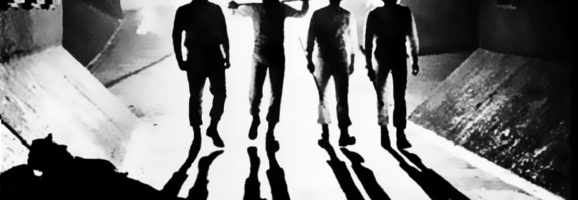
In contemporary society, few academic sources comment on the satire genre , most classifying it as a sub-genre of comedy. Despite incorporating comedic aspects, the overall concept of satire is vastly different to that of comedy, resulting in its own distinctive set of genre codes and conventions.
Satire films essentially feature a dark, comedic outlook on a grim situation. As the aim of the films is to bring to light subjects rarely confronted by the public, they are often received as offensive or inappropriate. Key subjects highlighted by the genre include war, mental illness, murder, rape, suicide and abuse.
The lack of academia surrounding this genre often makes satire films difficult to classify, particularly as fine lines exist between this, parody and black comedy. The key factor that differs satire from other genres is the social message that lies at its core. Today, satire proves to be a rare brand of film, often masked by additional genres, lessening the blow of the central message.
One of the few modern examples of satire lies in the 2006 film Little Miss Sunshine. Described by The Guardian as “satire with a safety cap”, this film explored the grotesque world of child beauty pageants long before Toddler’s and Tiara’s. The satirical storyline follows a dysfunctional family as they road trip across the country to enter their youngest daughter, Olive, into the “Little Miss Sunshine” beauty pageant. Throwing suicide, death and implied pedophilia into the mix, this film is about as close as contemporary film comes to satire.
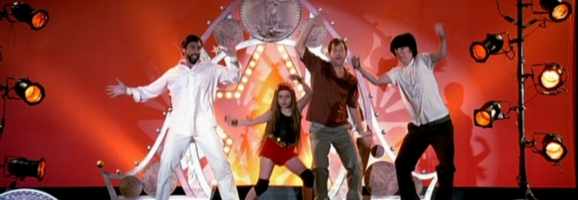
In contrast, the 1900s presented a wide range of satire films, often subjects around the key historical events that took place. Stanley Kubrick’s contribution to this genre is often seen as the most significant of filmmakers, his films touching on subjects particularly sensitive to the time. Throughout his range of satire films, Kubrick explored the topics of nuclear deterrence, war, rape, murder, pedophilia, prostitution and mental illness in order to send strong messages to the general public.
Today, Kubrick is recognised as one of history’s greatest filmmakers, the majority of his masterpiece’s permanently recognised in IMDB’s infamous “top 250 films of all time”. His tendency to produce abstract satires almost serves as his personal trademark, and his use of satire characterisation conventions have served as highlights in the careers of many great actors. Some of his most appreciated satire films include Dr. Strangelove or: How I Learnt to Stop Worrying and Love the Bomb, A Clockwork Orange, The Shining and Lolita.
The Shining (1980)
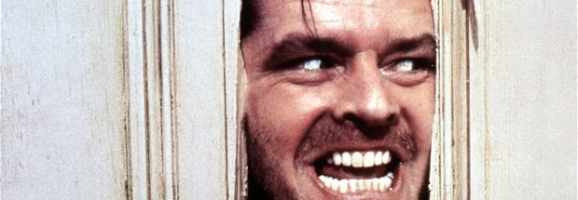
Stanley Kubrick’s adaptation of Stephen King’s novel “The Shining” collaborates themes from the satire genre with that of horror and mystery. Following the story of a family taking care of a desert ski lodge during the summer, this film particularly uses characterisation to give a comedic edge to the issue of mental health.
A young Jack Nicholson brilliantly portrays the gradual mental decay of protagonist Jack Torrence. The gesture and dialogue codes seen through this character are supportive of characterisation conventions typical of the satire genre. The use of a charismatic or charming character humanising evil themes is used frequently within the satire genre. Here, Jack Nicholson portrays his character as a quirky and often humorous character whose primary goal towards the end of the film is to brutally murder his family.
Nicholson’s interpretation of Jack Torrence comes as a terrifying character whose motives towards his wife and son are often shaded by his charming smile. Satire dialogue and gesture codes are shown clearly in the scene in which Jack axes his way into the bathroom his wife is hiding in:
Jack’s facial expressions and yell of “hheerrree’sss Johnny!” reflects the essence of satire: a comedic take on a grim scene. The character’s mental illness has clearly peaked during this scene, resulting in a full breakdown.
Although satirical themes exist within the film, the genre’s presence is not as strong as within Kubrick’s earlier films. A possible reason for this may be the release date of the film. The 1980s not only saw the end of the Cold War, but a significant progression in social issues and the slight commercialisation of Kubrick’s film style. These factors could have impacted Kubrick’s use of satire within The Shining.
Lolita (1962)

Often seen as his first attempt at satire, Stanley Kubrick’s adaptation of Lolita follows the story of a middle-aged professor’s infatuation with a 14 year-old girl. Despite censorship laws restricting the development of themes within the film, Kubrick managed to create a chilling satire that brought to light the subject of pedophilia.
Lolita is a flirtatious and temperamental 14 year-old who captures the eyes of two middle-aged men: Dr. Humbert Humbert (James Mason) and Clare Quilty (Peter Sellers). Although the girl is never forced into anything she doesn’t want to do, the film shows a gruesome insight into the life of a pretty girl as the subject of pedophilic interests.
Throwing a comedic light on this grim subject are the characters of Clare Quilty and Lolita’s mother. As Clare Quilty dresses up as a range of personalities to con Humbert, Lolita’s mother is throwing herself all over him like a lovesick puppy.
Peter Sellers performs his role brilliantly within Lolita, winning him a three leading roles in Dr. Strangelove and showing the world the strange, quirky acting style he is known for today. His satirical performance of a pedophile begins during a dance where he interacts with Lolita’s mother. Through this scene we can start to see pedophiliac qualities in Quilty, this is mixed in with the humorous level of desperateness shown by Lolita’s mother.
Lolita can clearly be classified as a satire film as it provides a comedic take on the dark subject of pedophilia. Through characterisation conventions, both Clare Quilty and Lolita’s mother are able to cast a comedic light on the unfortunate situation at hand, providing a chilling film despite censorship codes of the time.
A Clockwork Orange (1971)
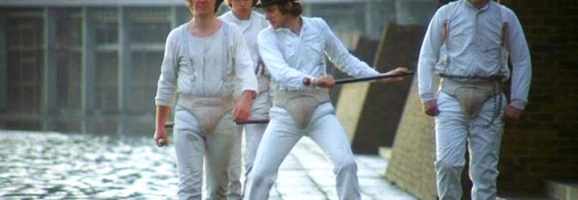
A Clockwork Orange is known to be one of the more controversial of Kubrick’s films, essentially following the story of a charismatic criminal who volunteers for an experimental aversion treatment. Confronting the general issue of criminal insanity, the film uses comedy to slightly lessen the blow of strong themes like rape, murder, abuse and mental illness. The film itself serves as a satire of modern society, confronting viewers through the use of a freedom-deprived, crime-ridden futuristic setting.
Alex, the protagonist, is seen as a juvenile delinquent obsessed with rape, violence and Beethoven. Kubrick presents this character in an unsettling manner typical of satire character conventions, making him evil yet charismatic to disorientate viewers. This characterisation is supported through music codes in particular, as Kubrick cuts horrifying scenes to a traditional, classical score. This adds a slight comedic aspect to the scene, despite its dark themes. Such a scene occurs when Alex puts his fellow delinquents in place:
Due to mass protest and controversy surrounding the film, Kubrick himself banned it in the United Kingdom in 1973. Years later, this ban was lifted, however the film will forever remain highly controversial and confronting to viewers from all generations.
Dr. Strangelove or: How I Learnt to Stop Worrying and Love the Bomb (1964)
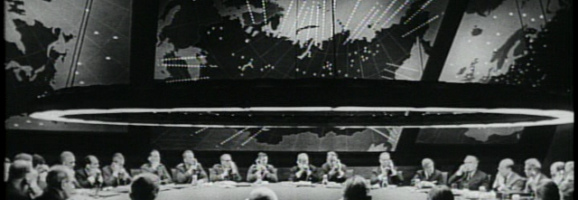
Dr. Strangelove is definitely in the running for the most satiric film ever created. Released during the Cold War, Kubrick uses the public’s very real paranoia to fuel a stream of controversial themes. Using a comedic take on accidental nuclear deterrence, the film successfully confronts the public and opens their eyes to what was then a sensitive subject. The dark themes used coupled with the timing of the release has produced a controversial satire which is, honestly, very weird.
The concept of nuclear deterrence combined with comedic relief provides grounding for the satire genre, allowing the film to use fiction to address public concerns. Character conventions and dialogue codes are particularly used to support Dr. Strangelove‘s satirical nature. Within this genre, key characters are generally seen to each embody a different angle of attack towards a central issue. Such character conventions are reflected within Dr. Strangelove.
The dialogue of Gen. Ripper, for example, positions his individual stance in favour of the bombing of Russia. This characters opinions on this issues is seen through his consistent use of the derogatory term “commies” in addition to his statement that the Russians are using water fluoridation to infiltrate America’s “precious bodily fluids.”
The use of satire dialogue codes to support character conventions allows Dr. Strangelove to clearly classify itself within the genre. Kubrick’s fondness and talent in creating satire is seen most evidently through this highly celebrated film.
These four films display the effective use of satire to highlight social issues through a comedic take. Through this display of films, it is evident that Stanley Kubrick has contributed significantly to the genre and is arguably one of the greatest satire filmmaker recognised today.
What do you think? Leave a comment.











I like the message of Clockwork. Humans have to do things the old-fashioned way – using your brain – to change your behaviour. It can’t be artificially adopted.
Although his film can be terrifying, I keep going back to them and I want to BE there, immersed in his world. So many scenes from Eyes Wide Shut and The Shining and 2001 would keep coming to mind and it gives me a warm feeling every time, almost like I am home. Sounds kind of stupid, but…
I haven’t felt this way about other films… only Kubrick’s. I don’t know what kind of magic he does but his work is so addicting. He’s one of the few directors whose movies I can watch repeatedly without getting bored (which is a big deal to me since I rarely watch movies more than once).
Oh no I absolutely know what you mean! His films have this unique quality about them that makes them strangely gripping despite the often horrifying themes within them. That’s probably why his work has massive cult followings 🙂
I agree. I think it boils down to the way he treated the viewer. The viewer is the observer of mostly very open minded concepts instead of the common narrow stories we have shoved down our throats that are designed to make us feel certain ways. Stanley gave the viewers more choice when watching a film, his films are more of an examination of the viewer than of the actual film in the way that he challenges his viewers to think and to look within ourselves. That’s one of the storytelling aspects that made him so different from most filmmakers. I think the commonly held belief by many critics that his films are cold is one of the most ridiculous misinterpretations I could ever fathom. For the most part, Stanley’s films were very deep, therefore if the viewer is also not afraid of looking deep within themselves, so are the thoughts and feelings of the viewer when watching his films, or even just thinking about them. Personally I think his films are among the most deeply emotional films ever made, contrary to many peoples belief. His films ask the toughest questions, that’s not cold at all, it’s deep, courageous, and truly can only come from a brilliantly visionary mind.
It’s also that openness and observational standpoint that makes his films easy to watch over and over again for open minded thinking people.
Stanley Kubrick is GOD! Here is my ranking of his work:
1) Dr. Strangelove – A personal, sentimental favorite of mine. It hits my funny bone just right.
2) 2001 – A great, genre defying science fiction film. I haven’t seen it many times, but it always leaves a great impression. It advanced movie storytelling, just like Citizen Kane did.
3) Paths of Glory – I enjoy it more than most folks, I imagine. It’s rare to see a WW1 film, even rarer to find a great one. The final scene gets me every time.
4) A Clockwork Orange
5) The Shining
6) Lolita – I find this film hilarious. Maybe I am just twisted
7) Spartacus
8) The Killing
9) Killer’s Kiss- The indie filmmaker in me loves a lot of this movie.
10) Full Metal Jacket – It has never felt like a full movie to me. I love the Drill Sergeant scenes and am bored the Vietnam stuff.
11) Eyes Wide Shut – I just hated it and the impression does not get any better after multiple viewings. I find the whole movie to be dull and lacking any sense of pacing.
I haven’t seen Barry Lyndon or Fear And Desire yet.
Haha very very good ranking here, I would definitely put his films in an order similar. Dr. Strangelove is possibly my favourite film of all time, its just the right amount weird and funny 🙂 Also Peter Sellers is amazing…
I haven’t seen Barry Lydon yet either but its supposed to be amazing.. If you’re super into Kubrick (like I am) there’s this great book called “Stanley Kubrick: The Complete Films” which is inarguably my best purchase ever.. it talks about how and why he created his films 🙂
I agree with the other three films, but I’m not so sure about The Shining’s usage of satire in relation to social issues, apart from the generic idea that everyone could have an evil side to them.
I think that all of stanley kubrick movies are great and are must sees with the exceptions of the killing, Lolita, and gladiator. Which are also very good though. But I would recommend to start with a clockwork orange. In my opinion it’s the kubrick movie I “enjoyed” the most and the had the most fun watching. While it also was deep. But 2001 is one of my favorite films of all time but it is a TOUGH watch. Ill be the first to admit you won’t be sitting there with a smile on your face during the 20 minute trip scene. The film is more of an experience that I will definitely not watch frequently watch, but to see it once is an absolute must. But also full metal jacket is a phenomal movie which the first half of the movie is tied with the first third of clockwork orange the debate scene in paths of glory and the last 20 minutes of 2001 for the best stuff kubrick has ever done.
When I watched Barry Lyndon recently (third or fourth time) I must say the satisfaction did not stand out most as far as I’m concerned. Yet I did note it was nearly always related to violence or the duels. Especially when Bullingdon is asked at the end of the film have you received satisfaction (the most obvious example). I can’t recall the other moments now, but somehow they nearly all seem related to this or ‘revenge’ in general.
Yet to me it seems more interesting as a critique/reflection on the state which ‘society’ is moving towards. Lyotard mentions this in his Postmodern Condition, he calls it “the culture of complacency.” Everyone now demands and gets ‘entertainment’, is constantly satisfied on very small level, with very small things (and especially now: alot faster, ie twitter). Zizek also notes this when he writes that today we have the Superego injunction – To Enjoy (almost no boundaries, the permissive society).
What I particularly noticed this time when watching Barry Lyndon was that the women etc only go for men with status, especially in the beginning when Barry loses the girl to Captain Quinn.
There also seemed alot going on with illusions/lying. Think about Barry, disguised and dressed as an enemy army soldier when he deserted the army. In this case he has to keep up appearances against Potzdorf. Yet then there is an ironic twist: Barry is unmasked, and punished. But then he works for Potzdorf to spy on Chevalier de Balibari, he has to disguise himself once again but this time he gets paid for it.
I agree that satire seems to be somewhat of a dying art form and that nobody could do satire quite like Kubrick. That said, I do think similar genres like black comedy are alive and well with the likes of Paul Thomas Anderson, Spike Jonze, David Fincher, and of course Martin Scorsese. These directors definitely get a kick out of pushing grim situations and twisted individuals to the brink of humor, often to the point where the line between comedy and drama blurs considerably. Though their films may lack the immediate social satire of films like Strangelove and Clockwork, they often tackle both relevant and topical societal issues.
Oh yeah I totally agree! Black Comedy is definitely still alive in contemporary filmmaking. Have you seen In Bruges? Great dark comedy 🙂
Kubrick is easily one of the greatest directors ever, and has made some of my favorite films. While he definitely helped add an comedic/satirical edge to A Clockwork Orange, I would actually argue that most of it came from Burgess’s original novel. Because of the way Burgess wrote the novel, it’s really easy to get lost and confused in the language sometimes. But at its core, the writing, given the content, actually has a comedic tone to it and it’s easy to miss because of the language. Well, I think it has a comedic tone to it, at least. I just think Kubrick was able to add to the already comedic tone of A Clockwork Orange because, unlike Burgess, Kubrick was working with a visual and auditory medium which makes something like comedy and satire more palpable.
Oh definitely a good point! You can also see that in Lolita too, the book is crudely amusing and heavy with satire.
I think the books Kubrick chose to adapt definitely have a large influence over his reputation and film style. I’ll have to check out Burgess’ novel 🙂
The Shining is satirical of both conventional familial stereotypes as well as pulp horror conventions (e.g. the sharp musical accent as the simple title “Tuesday” comes on the screen) but I wouldn’t label the film a satire. Like Eyes Wide Shut and 2001 A Space Odyssey, Kubrick infused many parts of his films with a droll dark humor. I have often wondered if the awkwardness I perceive in many of his films is bad acting, bad direction or intentionally flat superficiality reflecting a cynical opinion of basic human communication and customs. I am thinking that he just liked to make fun of civilized pretenses [“Bill, I’d like you meet Jack Torrance” “Bill” “How do you do?” Bill, how do you do?” “Nice to meet you” “Pleasure to meet you”]. I am not really a fan of satire but I agree that Stanley Kubrick was a master of formulating black/ironic humor in a filmic context.
His method of using long single takes with medium shots and very calculated nuance in the performances can give people a sense of dispassionate or insensitive cynicism which I won’t argue against but I do think his films (at least 2001 and after) are more cerebral than conventionally emotional (Barry Lyndon may be an exception to this as there is one scene that is very naturalistic and emotional towards the end).
I grew up watching The Shining (often under the influence of marijuana or LSD) and also I found the way it was directed allowed a sense of immersion that I found strange comfort in. Being a preconscious only child with parents who had slight similarities to the actors made it all the more warm and personal for me though I can understand why some people see the film as “a bit cold and pointless”.
As someone who was afraid of the idea of eternal life during childhood it is amusing to me that Kubrick made unsettling reference to eternity in several of his films “forever and ever and ever” in A Clockwork Orange and The Shining and “let’s not use that word, it frightens me” from Eyes Wide Shut. I don’t see the guy as some kind of demigod and I sympathize with those who find his work pretentious and/or offensive, but there is no denying his abilities behind the camera and the effectively provocative nature of his films.
Where is ‘Eyes Wide Shut’ on this list? It’s still a film that I believe to be misunderstood by many (and most probably myself!) but the sharp criticism of consumer culture over traditional family values and the importance of sex in the film is something which Kubrick wants us to laugh about on occasion, even within the context of his unarguably serious final film. It is littered with humorous moments amidst the murder and orgies; maybe the mere involvement of murder and orgies in a film which is seemingly so grounded in the real world is an attempt at black humour.
Could not agree more – it’s his masterpiece.
I only took a look at a selection of his films, but Eyes Wide Shut would definitely be grouped with Kubrick’s satirical works!! Such a great film, and the humorous take on the dark social commentary is definitely evident 🙂
The thing about Kubrick is he can take exaggeration to a satisfying level without it seeming too goofy or intrusive, he seems to hit the nail on the head every time. I’ll always admire his work on Dr. Strangelove; it’s satirical perfection.